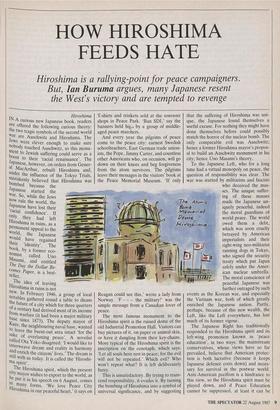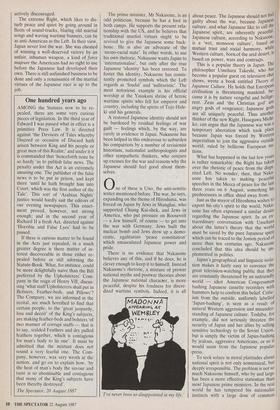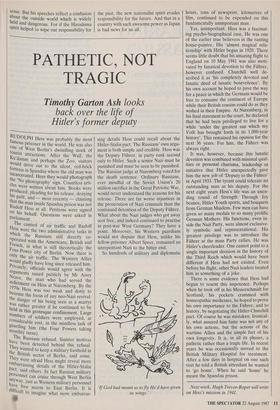HOW HIROSHIMA FEEDS HATE
Hiroshima is a rallying-point for peace campaigners.
But, Ian Buruma argues, many Japanese resent
the West's victory and are tempted to revenge
was The idea of leaving Hiroshima in ruins is not new. In February 1946, a group of local notables gathered round a table to dicuss the future of a city which for three quarters of a century had derived most of its income from warfare (it had been a major military base since 1873). The deputy mayor of Kure, the neighbouring naval base, wanted to leave the burnt-out area intact 'for the sake of everlasting peace'. A novelist called Ota Yoko disagreed: 'I would like to interweave dream and reality in harmony and enrich the citizens' lives.' The dream is still with us today. It is called the 'Hiroshi- ma spirit'.
The Hiroshima spirit, which the present City mayor wishes to export to the world, as he put it in his speech on 6 August, comes In. many forms. 'We love Peace City Hiroshima in our peaceful heart,' it says on
T-shirts and trinkets sold at the souvenir shops in Peace Park. 'Ban SDI,' say the banners held hig.i by a group of middle- aged peace marchers.
And every year the pilgrims of peace come to the peace city: earnest Swedish schoolteachers, East German trade union- ists, the Pope, Jimmy Carter, and countless other Americans who, on occasion, will go down on their knees and beg forgiveness from the atom survivors. The pilgrims leave their messages in the visitors' book at the Peace Memorial Museum. 'If only Reagan could see this,' wrote a lady from Norway. `F — — — the military!' was the simple message from a Canadian lover of peace. The most famous monument to the Hiroshima spirit is the ruined dome of the old Industrial Promotion Hall. Visitors can buy pictures of it, on paper or animal skin, or have it dangling from their key-chains. More typical of the Hiroshima spirit is the inscription on the cenotaph, which says: `Let all souls here rest in peace; for the evil will not be repeated.' Which evil? Who won't repeat what? It is left deliberately fuzzy.
This is unsatisfactory. By trying to trans- cend responsibility, it evades it. By turning the bombing of Hiroshima into a symbol of universal significance, and by suggesting that the suffering of Hiroshima was uni- que, the Japanese found themselves a useful excuse. For nothing they might have done themselves before could possibly match the horror of the nuclear bomb. The only comparable evil was Auschwitz; hence a former Hiroshima mayor's propos- al to build an Auschwitz monument in his city; hence Uno Masami's theory.
The Japanese Right has traditionally responded to the Hiroshima spirit and its left-wing promotion known as 'peace education', in two ways: the mainstream conservatives, whose views have so far prevailed, believe that American protec- tion is both lucrative (because it keeps Japanese defence costs down) and neces- sary for survival in the postwar world. Anti-American pacifism is a hindrance to this view, so the Hiroshima spirit must be played down, and if Peace Education cannot be suppressed, at least it can be actively discouraged.
The extreme Right, which likes to dis- turb peace and quiet by going around in fleets of sound-trucks, blaring old martial songs and waving wartime banners, can be as anti-American as the Left. In their view, Japan never lost the war. She was cheated of winning a well-deserved victory by an unfair, inhuman weapon, a kind of force majeure the Americans had no right to use before the Japanese had developed their own. There is still unfinished business to be done and only a renaissance of the martial virtues of the Japanese race is up to the job. The prime minister, Mr Nakasone, is an odd politician, because he has a foot in both camps. He supports the present rela- tionship with the US, and he believes that traditional martial virtues ought to be revived to give the Japanese some back- bone. He is also an advocate of the 'mono-racial state'. In other words, to use his own rhetoric, Nakasone wants Japan to 'internationalise', but only after the true Japanese 'identity' his been restored. To foster this identity, Nakasone has consis- tently promoted symbols which the Left regards as 'feudal' and 'militaristic'. The most notorious example is his official worship at the Yasukuni shrine of heroic wartime spirits who fell for emperor and country, including the spirits of Tojo Hide- ki and his generals.
A restored Japanese identity should not be burdened by residual feelings of war guilt — feelings which, by the way, are rarely in evidence in Japan. Nakasone has been helped in this endeavour to unburden his compatriots by a number of revisionist historians, nationalist anthropologists and other sympathetic thinkers, who conjure up excuses for the war and reasons why the Japanese should feel good about them- selves.
0 ne of these is Uno, the anti-semitic writer mentioned before. The war, he says, expanding on the theme of Hiroshima, was forced on Japan by Jews in Shanghai, who supported Chiang Kai-shek, and Jews in America, who put pressure on Roosevelt — a Jew himself, of course — to get into the war with Germany. Jews built the nuclear bomb and Jews drew up a demo- cratic, egalitarian 'peace constitution' which emasculated Japanese power and pride.
There is no evidence that Nakasone believes any of this, and if he does, he is clever enough to keep it to himself. Instead Nakasone's rhetoric, a mixture of prewar national myths and postwar theories about the Japanese national character, is more peaceful, despite his fondness for discre- dited wartime symbols. Indeed, it is all
`I've never been so disappointed in My life.'
about peace. The Japanese should not feel guilty about the war, because Japanese culture, and what Japanese like to call the
Japanese spirit, are inherently peaceful. Japanese culture, according to Nakasone, is a 'wet, monsoon culture', based on mutual trust and social harmony, while Western culture, born.of the arid desert, Is based on power, wars and contracts.
This is a popular theory in Japan. The philosopher Umehara Takeshi, who has become a popular guest on television chat shows, wrote a book entitled Theory of Japanese Culture. He holds that European civilisation is threatening mankind, be-
cause it is by nature vengeful and bellige- rent. Zeus and 'the Christian god' are
angry gods of vengeance; Japanese gods
are all uniquely peaceful. Thus another thinker of the new Right, Hasegawa Michi-
ko, can argue that the Japanese war was a temporary aberration which took place because Japan was forced by Western imperialism to join the aggressive outside world, ruled by bellicose European na- tions.
What has happened in the last few years is rather remarkable: the Right has taken
over the rhetoric of peace from the dispi- rited Left. No wonder, then, that Naka- sone has taken to making peaceful speeches in the Mecca of peace for the last three years on 6 August, something his predecessors in office shied away from. Just as the mayor of Hiroshima wishes to export his city's spirit to the world, Naka- sone has often expressed a similar desire regarding the Japanese spirit. In an ex- traordinary conversation with Umehara about the latter's theory that the world must be saved by the pure Japanese spirit which can be traced to the Jomon period of more than ten centuries ago, Nakasone concluded that this idea should be im- plemented in politics. Japan's geographical and linguistic isola- tion makes it fairly easy to convince the great television-watching public that they are constantly threatened by an unfriendly world — idiot American Congressmen bashing Japanese cassette recorders with hammers help to confirm this belief. Critic- ism from the outside, uniformly labelled `Japan-bashing', is seen as a result of natural Western aggression and misunder- standing of Japanese culture. Toshiba, for example, did not seriously threaten the security of Japan and her allies by selling sensitive technology to the Soviet Union, but is simply the victim of Japan-bashing by jealous, aggressive Americans, or so it would seem from the Japanese popular press.
To seek solace in moral platitudes about national spirit is not only nonsensical, but deeply irresponsible. The problem is not so much Nakasone himself, who by and large has been a more effective statesman than most Japanese prime ministers. In the real world he has tempered his nationalist instincts with a large dose of common sense. But his speeches reflect a confusion about the outside world which is widely held and dangerous. For if the Hiroshima spirit helped to wipe out responsibility for the past, the new nationalist spirit evades responsibility for the future. And that in a country with such awesome power as Japan is bad news for us all.












































 Previous page
Previous page